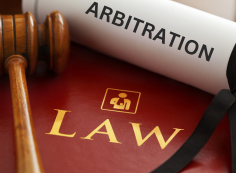What you’ll acquire:
- Acquire an in-depth understanding of core modules pertaining to legal frameworks and standards.
- Grasp the foundational and advanced principles of Arbitration, Conciliation, and Alternate dispute resolution.
- Enhance analytical skills to dissect complex legal issues and formulate cohesive arguments through the application of legal theories and doctrines.
- Prepare comprehensively for the bar exam or other legal examinations through a well-structured curriculum and focused study materials.
Ready for law? Here's what you need!
- Fundamental knowledge of jurisprudence concepts
- A proactive attitude toward understanding legal frameworks
- Competency in critical analysis and reasoning
- Proficiency in verbal and written communication
- A keen interest in societal structures and norms
- Commitment to ethical practices and integrity in the field of law
Description:
Greetings! Everyone, I am honored to be your guide on this enlightening journey through the complexities of the law. This course has been meticulously designed to provide an in-depth understanding and mastery of various branches of law, offering valuable insights and materials to accelerate your learning curve.
Who can benefit from this course?
Whether you're an aspiring legal professional embarking on your LLB journey, gearing up for your exams, or an enthusiast keen to unravel the world of law, Arbitration, Conciliation, and Alternate dispute resolution cater to a wide spectrum of learners. We cover a well-rounded curriculum that encapsulates both traditional and contemporary branches of law, designed to give you a holistic perspective.
Comprehensive curriculum featuring: Arbitration, Conciliation, and Alternate dispute resolution
Origin and Scope of Arbitration: Arbitration is a method of dispute resolution where parties agree to settle their conflicts outside of traditional court proceedings. Its origins can be traced back to ancient times when merchants sought neutral third parties to resolve disputes. Today, arbitration provides an alternative to litigation, offering flexibility, confidentiality, and specialized expertise. Its scope encompasses a wide range of disputes, including commercial, labor, international, and construction-related matters, emphasizing a party-driven process to reach a binding resolution.
Arbitration Tribunal: An arbitration tribunal, also known as an arbitration panel or arbitral tribunal is a central component of the arbitration process. It consists of one or more arbitrators appointed by the parties or a designated institution. These arbitrators serve as impartial decision-makers responsible for considering evidence, arguments, and applicable laws to render a fair and binding resolution to the dispute at hand. The tribunal's composition and procedures are defined by the arbitration agreement or relevant institutional rules.
Award: An award in arbitration is the final decision or resolution provided by the arbitration tribunal. It is the outcome of the arbitration process, where the arbitrators assess the facts, arguments, and evidence presented by the parties and deliver a binding decision. The award specifies the relief, monetary compensation, or other resolutions granted to the prevailing party, concluding the dispute in accordance with the terms outlined in the arbitration agreement or applicable laws.
Appeal and Revision: In the context of arbitration, appeal and revision refer to the limited mechanisms available for challenging or reviewing an arbitration award. However, arbitration awards typically have limited avenues for appeal or revision. The parties may agree on specific grounds for appeal in the arbitration agreement or follow the regulations of the arbitral institution involved. Common grounds for appeal or revision may include procedural irregularities, lack of jurisdiction, or a challenge to the award's enforceability based on public policy.
Conciliation: Conciliation is a dispute resolution process where an impartial third party, the conciliator, facilitates communication and negotiation between the disputing parties to help them reach a mutually agreeable settlement. Unlike arbitration, the conciliator does not render a binding decision but assists the parties in exploring options and finding common ground. The objective of conciliation is to maintain or repair relationships while resolving disputes amicably, promoting understanding and compromise between the involved parties.
Exclusive Resources and Materials:
Interactive Video Lectures: Engage in dynamic video lectures that facilitate a deeper understanding of Arbitration, Conciliation, and Alternate dispute resolution.
Subject-Specific Assignments: Hone your analytical and critical thinking skills with assignments tailored to Arbitration, Conciliation, and Alternate dispute resolution.
Multiple Choice Questions (MCQs): Test your knowledge through a series of MCQs designed to reinforce your understanding of Arbitration, Conciliation, and Alternate dispute resolution.
Short Q&A Sessions: Participate in brief Q&A sessions to clarify doubts and foster Arbitration, Conciliation, and Alternate dispute resolution.
Comprehensive Study Material: Gain access to an extensive collection of study materials that support your learning journey at every step of Arbitration, Conciliation, and Alternate dispute resolution.
Your Gateway to Legal Mastery:
The Arbitration, Conciliation, and Alternate dispute resolution aims to be your one-stop destination for legal expertise, offering a robust set of tools and resources that I used to excel in my LL.B. program. It serves as an excellent precursor for those venturing into their degrees and a refresher for those gearing up for their exams.
Join us in this legal endeavor:
Thank you for considering the Arbitration, Conciliation, and Alternate dispute resolution as a step towards achieving your educational aspirations in the field of law. We eagerly await the opportunity to facilitate your journey to becoming a legal aficionado.
See you on the course!






